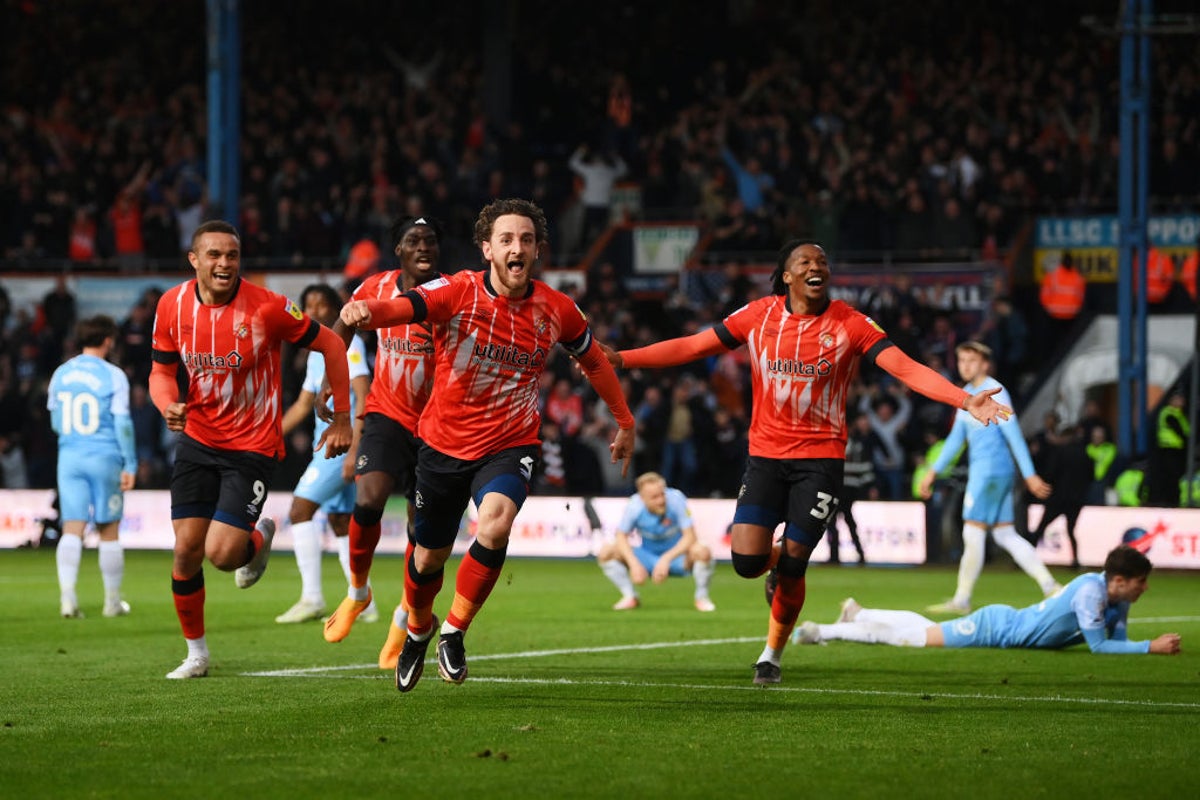
For Coventry City and Luton Town, how do you even begin to quantify the enormity of Saturday’s Championship play-off final?
Financially, of course, the prize is seismic. The winner can expect additional revenues between £170-285m over the next three seasons, depending how long they stay in the top flight. When you consider that both clubs’ annual income is around £17-18m right now, those are transformative, lottery-ticket numbers.
That money will go to good use. Luton are preparing to move from the rickety old shed that is Kenilworth Road to a new home at Power Court in the centre of town. The club have been looking to expand from the confines of the 10,000-capacity ground for more than half a century, with each new plan coming up against planning or finance restrictions, but a new start is finally coming.
At least they’ve had a steady home – Coventry fans have spent far too much time recently trekking to Birmingham and Northampton to groundshare amid disputes over their on-and-off stadium, the CBS Arena. The club’s new owner, local businessman Doug King, is still working on a long-term agreement to secure their future at the stadium. At both clubs, facilities need upgrading; thin squads and stretched staff need investment.
Money is certainly part of the story here. These two clubs have been to the brink and faced serious existential threat. Luton were docked 30 points amid financial woes in 2008-09 and fans still sing about being let down by the FA. Coventry’s holding company went into liquidation in 2013.
But this game is also about the resilience of football clubs, especially those historic institutions that are part of the fabric of their place. It is about how they keep springing back to life however hard they’re trampled, and about what might one day blossom from a lot of graft and a little hope.
Both were in League Two as recently as 2018. Coventry’s rise since then is in no small part down to the management of Mark Robins, now in his sixth year in charge. He has grabbed hold of every element of the club and demanded higher standards. “He was putting things in place on a weekly basis,” Robins’ first captain Michael Doyle told The Guardian. “He has built Coventry from the bottom up. He’s 90 minutes away from a statue of him going up outside the ground … he is just a brilliant manager.”

A year earlier Luton had taken a punt on the unproven Nathan Jones. He steered them away from relegation from the Football League and oversaw a full-scale revamp of the squad, guiding them to League One and later cementing their place in the Championship across two stints. The club’s stewardship under the 2020 group – made up predominantly of Luton supporters – has been essential in restoring planning and direction over a decade of relentless progress.
Coventry and Luton have plenty in common – a historic Midlands city and an old southern town which became hubs of the British car industry – and their football clubs are strangely mirrored. Coventry were founded in 1883, Luton in 1885, and in that time each have drifted between divisions, winning one major trophy along the way: Coventry won the FA Cup in 1987, Luton won the League Cup in 1988. Coventry would be the first Premier League side to drop down to League Two and return; Luton would be the first English club to drop from the top tier to non-league and rise to the top again.
They are the embodiment of what makes England’s football pyramid special, as Pep Guardiola extolled this week. It is what curious investors like Ryan Reynolds and Rob McElhenney fell in love with, that romantic idea – alien in most American sports – that any team can climb anywhere, that no dream is too big. It is this risk and reward that many owners at the elite end are terrified by, and it is why their heads were turned by the prospective Super League, to ring-fence revenues and create a closed shop. It is what fans up and down the country came out in force to fight for.
Coventry and Luton can each transform their future by winning one match at Wembley this weekend. But their journeys also represent something greater, a symbol of possibility. After all they’ve been through, whoever celebrates promotion to the Premier League will richly deserve their reward.







